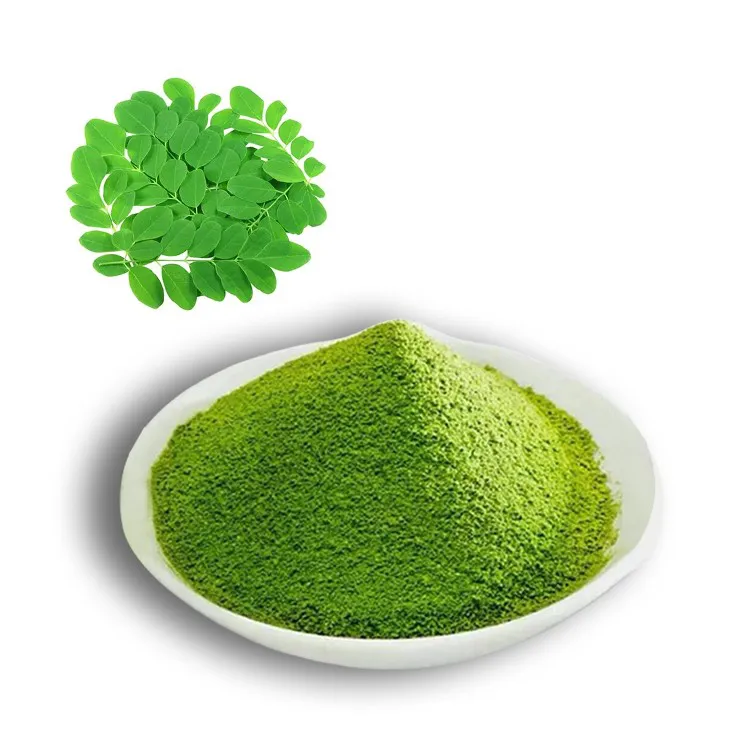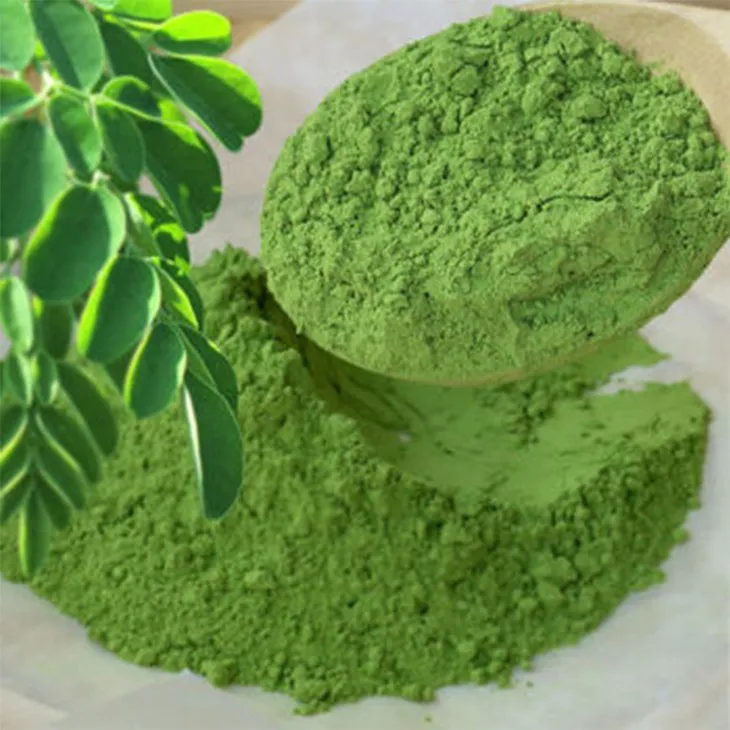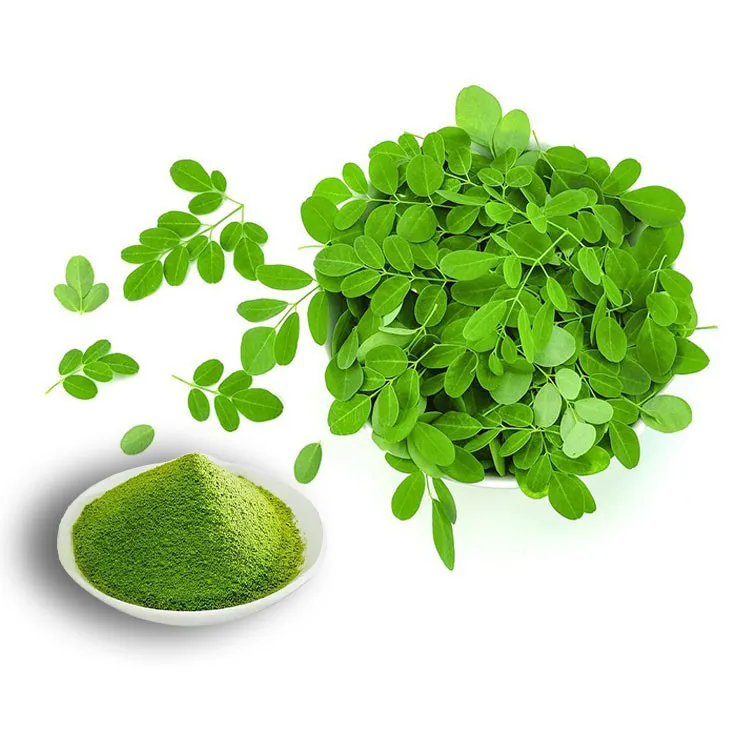- 0086-571-85302990
- sales@greenskybio.com
What is moringa powder and why is it used on the skin?
2024-11-13

1. Introduction to Moringa powder
Moringa powder has been steadily rising in popularity within the realm of skin care. But what exactly is it? Moringa powder is derived from the Moringa oleifera plant, which is often referred to as the "miracle tree" due to its numerous health - enhancing properties. This plant is native to parts of South Asia and has been used for centuries in traditional medicine systems.
The Moringa oleifera plant is highly nutritious. It is rich in essential amino acids, which are the building blocks of proteins. These amino acids play a crucial role in maintaining the overall health of the skin. Amino acids help in the production of collagen, a protein that gives the skin its elasticity and firmness. Without an adequate supply of amino acids, the skin can become saggy and less resilient over time.
In addition to amino acids, moringa powder contains a wealth of minerals. Minerals such as zinc, iron, and calcium are present in the powder. Zinc, for example, has anti - inflammatory properties and is also important for wound healing. It helps in reducing redness and irritation on the skin. Iron is essential for healthy blood circulation, which in turn ensures that the skin cells receive an adequate supply of oxygen and nutrients. Calcium contributes to the strength and structure of the skin cells.
One of the most notable components of moringa powder is its antioxidants. Antioxidants are substances that can prevent or slow damage to cells caused by free radicals. Free radicals are unstable molecules that are produced as a by - product of normal cell metabolism. They can also be generated by external factors such as pollution, UV radiation, and smoking. If left unchecked, free radicals can cause oxidative stress in the skin, which leads to premature aging, wrinkles, and dullness.

2. How Moringa Powder Benefits the Skin
2.1 Anti - Aging Effects
The antioxidants in moringa powder are highly effective in combating premature aging. As mentioned earlier, free radicals can cause oxidative stress, which damages the skin's cells and accelerates the aging process. The antioxidants in moringa powder, such as vitamin C, vitamin E, and beta - carotene, neutralize these free radicals. Vitamin C is a powerful antioxidant that stimulates the production of collagen. Collagen production tends to decline with age, leading to the formation of wrinkles. By promoting collagen synthesis, vitamin C in moringa powder helps in reducing the appearance of wrinkles and fine lines, giving the skin a more youthful and smooth appearance.
Vitamin E also plays a significant role in anti - aging. It protects the skin's lipid layer from oxidative damage. This lipid layer is important for maintaining the skin's moisture barrier. When the lipid layer is damaged, the skin becomes more prone to dryness, which can further exacerbate the signs of aging. Vitamin E in moringa powder helps in keeping this lipid layer intact, thus preventing moisture loss and maintaining the skin's suppleness.
2.2 Anti - Inflammatory Properties
Moringa powder contains anti - inflammatory elements that are beneficial for soothing irritated skin. Skin inflammation can be caused by a variety of factors, including allergens, harsh chemicals in skin products, and environmental pollutants. Inflammatory skin conditions can present as redness, itching, and swelling. The anti - inflammatory components in moringa powder help in reducing these symptoms.
For example, Quercetin, a flavonoid present in moringa oleifera, has been shown to have anti - inflammatory effects. It inhibits the production of inflammatory mediators in the skin, such as cytokines and prostaglandins. By reducing the production of these mediators, Quercetin helps in calming down the inflamed skin, making it look and feel better.
2.3 Antibacterial Action
The antibacterial nature of moringa powder is another reason why it is used on the skin. The skin is constantly exposed to various bacteria, some of which can cause infections and breakouts. Moringa powder contains compounds that can inhibit the growth of bacteria on the skin.
One such compound is pterygospermin. Pterygospermin has been found to have antibacterial properties against common skin bacteria such as Staphylococcus aureus and Propionibacterium acnes. Staphylococcus aureus can cause skin infections like impetigo and cellulitis, while Propionibacterium acnes is associated with acne. By keeping these bacteria in check, moringa powder can help in preventing skin infections and reducing the occurrence of acne breakouts.

3. How to Use Moringa Powder on the Skin
There are several ways to incorporate moringa powder into your skin care routine.
3.1 Masks
- Homemade Moringa Mask: You can make a simple moringa mask at home. Mix moringa powder with a suitable liquid such as water, honey, or yogurt. For example, mix 2 tablespoons of moringa powder with 1 tablespoon of honey and enough water to form a paste. Honey has moisturizing properties, and yogurt contains lactic acid, which can exfoliate the skin gently. Apply the paste to your face and leave it on for about 15 - 20 minutes. Then, rinse it off with warm water. This mask can help in nourishing the skin, reducing inflammation, and improving the skin's complexion.
- Commercial Moringa Masks: There are also commercial skin masks available that contain moringa powder as one of the main ingredients. These masks are often formulated with other beneficial ingredients to target specific skin concerns. Follow the instructions on the product label for best results.
3.2 Cleansers
- DIY Moringa Cleanser: To make a moringa - based cleanser, mix moringa powder with a mild liquid soap or oil. For instance, combine 1 tablespoon of moringa powder with 2 tablespoons of castor oil and a few drops of lavender essential oil. Castor oil is a great natural cleanser, and lavender essential oil has antibacterial and soothing properties. Use this mixture to cleanse your face gently, massaging it in circular motions and then rinsing it off with warm water.
- Pre - made Moringa Cleansers: Many skincare brands are now offering cleansers that contain moringa powder. These cleansers are designed to effectively remove dirt, oil, and makeup from the skin while providing the benefits of moringa powder, such as anti - aging and antibacterial effects.
3.3 Toners
- Homemade Moringa Toner: You can create a moringa toner by steeping moringa powder in water. Boil a cup of water and add 1 - 2 teaspoons of moringa powder. Let it steep for about 10 - 15 minutes, then strain the liquid into a clean bottle. You can use this toner after cleansing your face. It helps in tightening the pores, balancing the skin's pH, and providing antioxidant protection.
- Store - bought Moringa Toners: There are also store - bought toners that incorporate moringa powder. These toners may be formulated with additional ingredients to enhance their effectiveness in treating different skin types and concerns.

4. Precautions and Considerations
While moringa powder has many potential benefits for the skin, there are also some precautions to keep in mind.
4.1 Allergic Reactions
Some people may be allergic to moringa oleifera. Allergic reactions can range from mild itching and redness to more severe symptoms such as swelling and difficulty breathing. Before using moringa powder on your skin for the first time, it is advisable to do a patch test. Apply a small amount of the moringa - based product (such as a mask or cleanser) on a small area of your skin, like the inside of your wrist. Wait for 24 - 48 hours and observe if there are any signs of an allergic reaction. If there is redness, itching, or swelling, do not use the product on your skin.
4.2 Quality of the Product
When using moringa powder for skin care, it is important to ensure the quality of the product. There are many sources of moringa powder available in the market, and not all of them may be of high quality.
- Source of the Moringa: Look for moringa powder that is sourced from organic and sustainable farms. Moringa plants grown organically are less likely to be contaminated with pesticides and other harmful chemicals.
- Processing Methods: Check how the moringa powder is processed. Ideally, it should be processed in a way that preserves its nutritional and beneficial properties. For example, cold - pressing is a better method than high - heat processing, as high - heat can destroy some of the antioxidants and other sensitive components in the moringa powder.
5. Conclusion
Moringa powder is a versatile and potentially beneficial ingredient for skin care. Its rich composition of amino acids, minerals, and antioxidants, along with its anti - aging, anti - inflammatory, and antibacterial properties, make it an attractive option for those looking to improve the health and appearance of their skin. However, as with any skin care ingredient, it is important to use it with caution, taking into account possible allergic reactions and ensuring the quality of the product. By understanding how moringa powder works and how to use it safely, you can potentially incorporate it into your skin care routine to achieve healthier and more radiant skin.
FAQ:
1. How is moringa powder made?
Moringa powder is made from the leaves of the Moringa oleifera plant. The leaves are carefully harvested, then dried and ground into a fine powder. This process helps to preserve the various nutrients present in the leaves.
2. Are there any side effects of using moringa powder on the skin?
While moringa powder is generally considered safe for skin use, some people may experience allergic reactions. It's always advisable to do a patch test on a small area of skin before applying it more widely. Also, if the powder is not from a reliable source, it may contain contaminants that could potentially cause skin issues.
3. Can moringa powder help with acne - prone skin?
Yes, it can. Due to its antibacterial properties, moringa powder can help combat the bacteria that contribute to acne. Additionally, its anti - inflammatory elements can reduce the redness and swelling associated with acne, making it beneficial for acne - prone skin.
4. How often should moringa powder be applied to the skin?
The frequency of application depends on individual skin type and the specific skin concern. For normal skin, applying it 2 - 3 times a week may be sufficient. However, for those with more skin problems like dryness or acne, it could be applied more often, up to daily, but always monitor the skin's reaction.
5. Does moringa powder work for all skin types?
Moringa powder has properties that can be beneficial for most skin types. For dry skin, its nutrient content can help moisturize and nourish. For oily skin, the antibacterial and astringent properties can help control sebum production. However, as mentioned before, individual reactions may vary, and it's important to test it first.
Related literature
- The Nutritional and Skin - Health Benefits of Moringa oleifera"
- "Moringa Powder in Skincare: A Comprehensive Review"
- "Antioxidants in Moringa and Their Impact on Skin Aging"
- ▶ Hesperidin
- ▶ citrus bioflavonoids
- ▶ plant extract
- ▶ lycopene
- ▶ Diosmin
- ▶ Grape seed extract
- ▶ Sea buckthorn Juice Powder
- ▶ Beetroot powder
- ▶ Hops Extract
- ▶ Artichoke Extract
- ▶ Reishi mushroom extract
- ▶ Astaxanthin
- ▶ Green Tea Extract
- ▶ Curcumin Extract
- ▶ Horse Chestnut Extract
- ▶ Other Problems
- ▶ Boswellia Serrata Extract
- ▶ Resveratrol Extract
- ▶ Marigold Extract
- ▶ Grape Leaf Extract
- ▶ blog3
- ▶ blog4
- ▶ blog5
-
Organic Tongkat Ali extract powder factory.
2024-11-13
-
How to make powder with ashwagandha extract.
2024-11-13
-
Rosehip extract manufacturers from China.
2024-11-13
-
The best cat's claw extract in nature.
2024-11-13
-
Chinese Dandelion Leaf Extract Suppliers.
2024-11-13
-
Black Pepper Extract
2024-11-13
-
Tormentil Extract
2024-11-13
-
Clove Powder
2024-11-13
-
Saffron Extract Powder
2024-11-13
-
Citrus bioflavonoids
2024-11-13
-
Sophora Flavescens Root Extract
2024-11-13
-
Tongkat Ali Extract Powder
2024-11-13
-
Fig Extract
2024-11-13
-
Dan Shen Root Extract/Salvia Root Extract
2024-11-13
-
Alisma Extract
2024-11-13





















